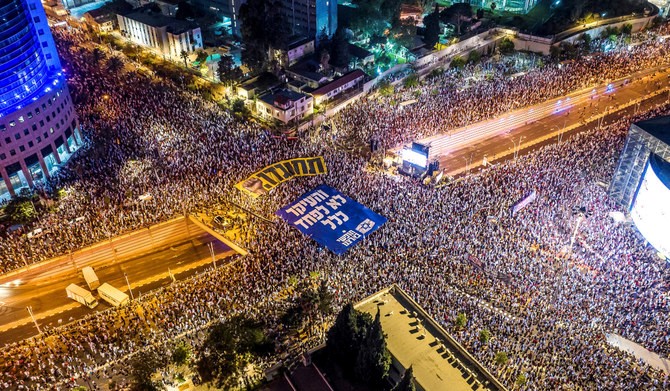TEL AVIV, Israel — Tens of thousands of Israelis poured into the streets of towns around the country on Saturday night to reject Prime Minister Benjamin Netanyahu’s disputed plan to revamp the judicial system.
Since Netanyahu’s government presented the revamp proposal, the grassroots movement has been holding rallies for almost six months. However, the protests have weakened in recent weeks.
The government’s plans to push the revamp through parliament next week, along with the firing of Tel Aviv’s police commander, who was accused of being too sympathetic to the protestors, appeared to give new life to Saturday’s demonstrations.
150,000 people flocked to central Tel Aviv, with big protests being held in Jerusalem and other major towns. Hundreds of people attempted to block Tel Aviv’s main roadway late Saturday, but were quickly dispersed by police. Scuffles erupted, and police sprayed the crowd with a water cannon.
Netanyahu’s allies have suggested a slew of changes to Israel’s judicial system aimed at limiting what they see as unconstitutional powers of unelected judges. The proposed changes include giving Netanyahu’s allies influence over the recruitment of judges as well as the ability to reject court decisions that they disagree with.
His opponents claim that the plan will undermine the country’s fragile system of checks and balances, concentrating power in the hands of Netanyahu and his friends. They further claim that Netanyahu has a conflict of interest because he is currently on trial for corruption. Wide sections of Israeli society have joined the protests, including reserve military officers, business leaders, LGBT and other minority organisations.
Last week, a legislative committee chaired by a Netanyahu ally adopted legislation that would prohibit Israeli courts from scrutinising the “reasonability” of decisions made by elected officials. A preliminary vote on the bill might take place as early as Monday.
The Supreme Court used the “reasonability standard” earlier this year to overturn the nomination of a Netanyahu loyalist as interior minister due to a previous bribery conviction and a 2021 plea bargain for tax cheating. Critics argue that abandoning that threshold would give the government too much authority and allow it to make arbitrary judgements.
protestors also decried the dismissal of Tel Aviv’s police chief, Ami Eshed, who indicated this week that he was compelled to retire due to political pressure to use force against protestors. Eshed frequently battled with Itamar Ben-Gvir, the hardline national security minister who has pushed that police take a harder stance against months of anti-government rallies.
Saturday’s rally is the latest in a string of protests that have seen thousands of Israelis take to the streets since January.
After enormous rallies in opposition, Netanyahu put the reform on hold in March, but announced this month that it will resume. Protests have shut down roads, disrupted the country’s primary airport, and packed major cities.
Source: AP










